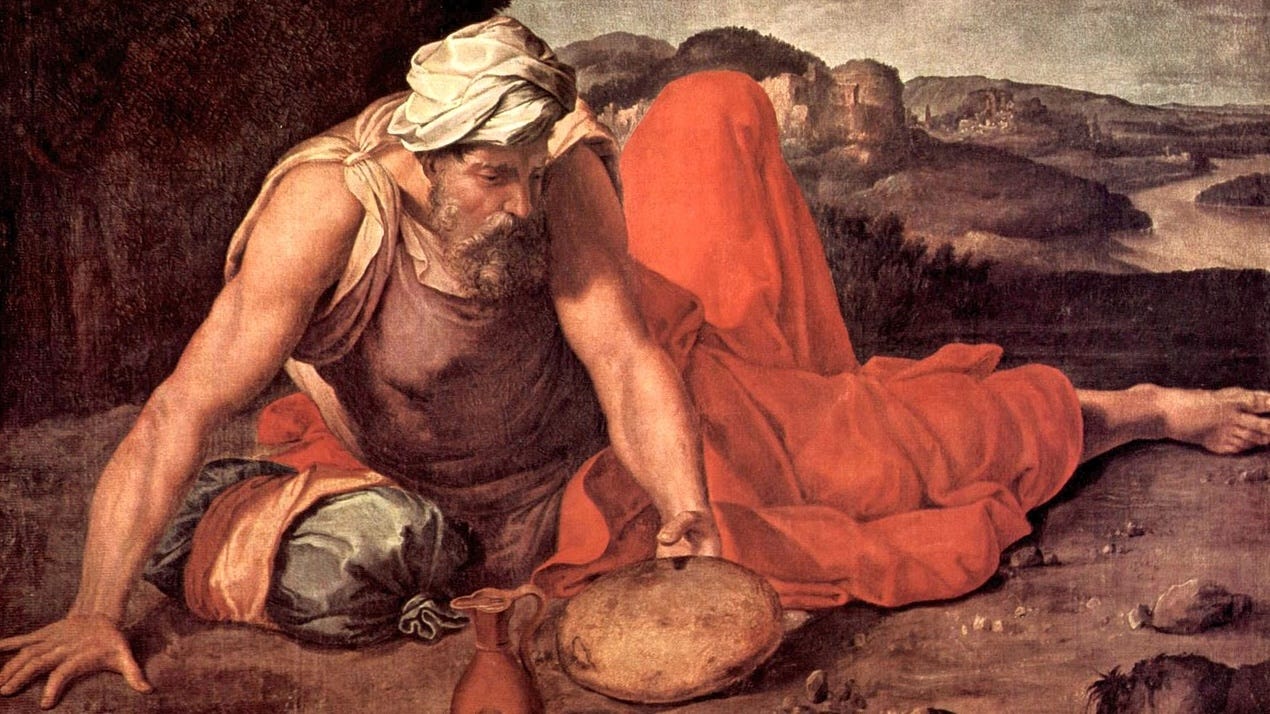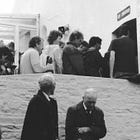Is desiring the sacraments individualistic and emotional? Lefebvre and others answer
Catholics today are forced to decide where they will and won't receive the sacraments. But is it rational to think that we actually need to receive them—or just 'emotional'?

‘[T]he angel of the Lord came again the second time, and touched Elias, and said to him: Arise, eat: for thou hast yet a great way to go.’
3 Kings 19.7
In this piece…
The supposed dichotomy as a means of restricting legitimate freedom
Grace supplies but does not necessarily replace
The importance of experience – which is not a modernist idea
Grace does not necessarily remove the consequences of what is lacking
Archbishop Marcel Lefebvre and the effects of the sacraments
Archbishop Marcel Lefebvre and the importance of attending Holy Mass
Bishop Guérard des Lauriers and others, on the dangers of sacramental deprivation
“Any just cause” – Canon 2261
Conclusion – what we’re saying and what we’re not saying
See the previous part:
Introduction
In the last piece, we saw that our situation is such that every Catholic has to decide which traditional Latin Masses and priests they will approach for the sacraments, as not all will be legitimate or advisable options.
This decision is not necessarily motivated by the idea that other groups are outside the Church, but rather by considerations of prudence and the integrity of doctrine.
However, we have to be realistic about the consequences of our choices.
It is easy to overlook the teaching of Catholic authorities about the necessity of the sacraments for salvation and spiritual health – and to propose, in its place, a hard dichotomy between the faith and the sacraments.
This is what some traditionalist voices do today, in their attempts to restrict the legitimate freedom of themselves and of others. Some such persons also suggest that a realistic appraisal of the necessity of the sacraments is selfish or individualistic, or arises from an "emotional attachment to the sacraments."
Rejecting such arguments is characterised as choosing the sacraments over the Faith, and trying to procure the sacraments "by hook or by crook," in a way that is offensive to God.
What should we make of this?
The Faith is indeed primary, and the Mass is indeed primarily about the public and perfect worship of God, rather than us receiving Holy Communion. But those making such arguments undermine themselves by failing to acknowledge that the sacraments, and the Holy Eucharist in particular, are crucial for sustaining the life of grace, as emphasised by magisterial teaching and theology.
The historical precedents of Catholics deprived of the sacraments also show that this is far from showing that this is a trivial concern.
We have a need, right and duty to receive Holy Communion. This is the testimony of the Church, her teaching, laws and her saints. There is nothing individualistic about this.
And while sometimes receiving the sacraments will indeed be impossible due to the circumstances, we have to appreciate the risks of being so deprived, and be very careful in assessing whether it really is impossible.
In this part, we will see how clergymen who opposed the Conciliar-Synodal Revolution—such as Archbishop Marcel Lefebvre, Bishop Guérard des Lauriers, and others—expressed these considerations.
But first, a word on grace and experience.
Grace supplies but does not necessarily replace
Because of human nature, we need visible and external rites for the exercise of the virtue of religion.
Some presume that if they are deprived of the sacraments for "legitimate" reasons, God will directly supply the graces they would have otherwise received.
This assessment significantly underestimates the problems and difficulties that exist in a state deprived of the sacraments.
If we look at the sorts of reasons St Thomas gives as to why visible means are necessary, we can also see the risks of being deprived of these visible means. For example, he says:
“[T]he condition of human nature which is such that it has to be led by things corporeal and sensible to things spiritual and intelligible.”1
Thus, without these corporeal and sensible things, it is harder for us to be led to spiritual and intelligible things.
“[God provides] man with a spiritual medicine by means of certain corporeal signs; for if man were offered spiritual things without a veil, his mind being taken up with the material world would be unable to apply itself to them.”2
Deprived of the sacraments and rites of the Church, we are forced to have more recourse towards “spiritual things without a veil.” Thus, without the visible signs, it is harder to pull ourselves from the material world towards spiritual things.
“Lest, therefore, it should be too hard for man to be drawn away entirely from bodily actions, bodily exercise was offered to him in the sacraments, by which he might be trained to avoid superstitious practices, consisting in the worship of demons, and all manner of harmful action, consisting in sinful deeds.”3
Thus, deprived of the material things of the Church, we are less able to be “trained” to avoid the dangers which St Thomas mentions.
The importance of experience – not a modernist idea
God can and does offer grace to those deprived of the sacraments through no fault or choice of their own. However, while God does supply such graces, it does not necessarily follow that they will be as efficacious as those that would have been received through the normal means.
We saw in the previous piece that (all things being equal) the actual reception of the sacraments is superior to the spiritual reception of their effects through the desire for the sacraments. However, this is not all.
Engaging in the public worship of the Catholic Church has a particular set of effects, as does being deprived of these effects. We can try to mitigate the effects of this deprivation as much as possible, and beg God to supply whatever it is that we are foregoing out of love for him.
Now, God not only supplies grace: he also can and does infuse knowledge and habits into the soul.
But it seems to be presumptuous to assume that God will directly infuse the knowledge and habits which we are supposed to receive through frequenting the visible rites and sacraments themselves. Such direct infusion does not appear to be the ordinary operation of providence, even for those deprived of the sacraments through no fault of their own.
This is perhaps most obvious in the case of those unfortunate children who do not attend Mass or receive the sacraments. Without any moral judgment, no matter how much grace has been supplied to such children, they typically show very limited signs of having had infused into them the knowledge and habits, which their Mass-going counterparts have developed naturally.
Nor should we write off such knowledge and habits as inessential or useless, just because other things might be more fundamental. They are important means of preserving more fundamental virtues – including the theological virtues themselves, but also the virtue of religion.
Religion is what is called a “moral virtue.” St Thomas teaches that while moral virtues direct our intentions towards the right goal, we cannot use the right means to achieve that goal without intellect and reason, directed through prudence and related intellectual virtues.
That is why he adds:
“[T]here can be no moral virtue without prudence: and consequently neither can there be without understanding.”4
There is nothing in our minds which has not come to us through our senses, in one way or another (including through reading or hearing). St Thomas states, following Aristotle, that experience is crucial for developing the virtue of intellectual virtue and prudence:
“The Philosopher says (Ethic. ii, 1) that ‘intellectual virtue is both originated and fostered by teaching; it therefore demands experience and time.’ Now prudence is an intellectual virtue, as stated above. Therefore prudence is in us, not by nature, but by teaching and experience.”5
We are not discussing ephemeral "religious experiences" in a modernist sense. Only someone with no actual experience of their own could think that talking of “experience” here is intrinsically modernist.
The absence of this religious experience (understood prosaically, rather than in a modernist way) can be a serious evil, depriving a person of the opportunity to cultivate virtues and good habits, and also of natural means that help to protect the soul.
Grace does not necessarily remove all the consequences
Whatever graces are supplied to us, they do not replace certain goods which are conveyed only through actual reception of the sacraments, and which are experienced and learned through assisting at Mass and receiving the sacraments.
For example: it could be profoundly negative for children to be deprived of:
The sacraments themselves
The understanding of what it means to be at Mass
The opportunity to exercise the virtue of religion itself and as Catholics
The opportunity to worship as Catholics.
While such deprivation may be profoundly negative, it does not necessarily mean that, all other things being equal, they will lose their souls as a result.
But are all other things equal? Is there not much danger in thinking, “I am not like the rest of men”? And is there not even more danger in making such presumptions about one’s family and dependants?
We can also illustrate the point by comparison with some other hypothetical situations familiar to traditional Catholics and accepted by them:
If false religions were suppressed, more souls would be saved
If vice is legalised or promoted, more souls will be lost
If a missionary order sends priests to a pagan country, more souls will be saved.
In a similar way, and for the same reasons:
If Catholics are unable to attend Mass and carry out basic aspects of the Catholic religion, fewer souls will be saved.
The truth of this point should be obvious – as well as the possibility that it could apply to any of us or our dependants.
This is clearly not an argument that one can, therefore, attend any given Mass and receive the sacraments there. This would be obviously fallacious.
But all of us – particularly our children – learn how to behave as Catholics in various ways, including through the experience of being at Mass and receiving the sacraments. It is simply false to think that there are no consequences to depriving ourselves and them of these ordinary ways, and it is false to condemn such considerations as rash or emotional.
With that in mind, let us see what some of the early traditionalist heroes had to say on this subject.
Archbishop Marcel Lefebvre and the effects of the sacraments
In the last piece, we discussed the difference between the actual and "spiritual" reception of the sacraments. Nothing in this essay should be taken as a denigration of "spiritual communions" or anything like that, which are devotions and practices commended by Holy Church.
In 1990, in his short work Spiritual Journey, Archbishop Lefebvre wrote about the effect of the actual reception of baptism on whole groups of converts in Africa:
"The visible outpouring of the Holy Spirit on the baptised at the beginning of evangelisation confirms the vital importance of baptism.
“Still today, in pagan regions, missionaries can recognise baptised people by their faces – faces which are open, relaxed, trusting – whereas the pagans give an impression of servility, fear and distrust.”6
From another perspective, Archbishop Marcel Lefebvre spoke strongly about the effects of receiving Holy Communion and attending the Holy Sacrifice of the Mass. In 1980, for example, he said in relation to current moral problems:
“The virtue of purity is supposedly no longer possible in our time.
“It is no longer possible because people no longer take the means, it is as simple as that. The gifts of God are the same as they were a century ago, as ten centuries ago, as fifteen centuries ago.
“But many no longer want them, no longer take advantage of them. So they complain that they do not have the strength: ‘in our time, in our time…’
“But let them take the means that God has given them! They will find them just as effective. That is something very important for us to bear in mind: prayer in families, the sacrament of penance, the reception of Holy Communion.”7 (Emphasis added.)
While the frequent practice of spiritual Communion is surely a good thing, this is not what is being discussed here.
The reason for this is as we have already seen: the actual reception of the sacraments is superior to receiving their effects spiritually through desire for the sacraments.
Also in 1980, he spoke about the effects of the frequent reception of Holy Communion on married couples:
“We can say in all truth that spouses who frequently assist at the renewal of the sacrifice of the cross, therefore at the renewal of the nuptials of our Lord with His Church, are resurrecting the sacramental grace of their marriage and increasing that particular grace which they need in order to accomplish worthily, as true Christians, what is asked of them in marriage.
“They have to assist at holy Mass. Holy Mass is truly the foundation stone of the Christian family. The Church willed it that way.”8
He does not say that the Church willed spiritual communions to be the foundation stone of the Christian family.
At another time, Archbishop Lefebvre talked about the consolation which the sacraments bring to the faithful:
“How many times have we priests been at the bedside of the dying! How many times have we brought Communion to the sick! What joy, for those who were suffering, to receive their God from the hand of the priest who came to bring them Holy Communion! What comfort! What a source of courage for them! By this sacrament our Lord Jesus Christ worked a tremendous miracle of His love. So we, too, have to show our love to Him!”9
Once again, he did not speak of this consolation as selfish, emotional or shameful, as some traditionalist voices do today. He spoke of it as something normal and the very intention of Christ himself.
This is the practice of the Church. It is simply not the practice of the Church to suggest that this is rooted in emotionalism or individualism.
Nor is it the practice of the Church to suggest that dying persons could consider saving the priest the bother of the journey, and make a spiritual communion instead.
So much for the sacraments. What about the Mass?
Archbishop Lefebvre and the importance of attending Mass
In 1989, the Archbishop spoke explicitly about the effect of the Mass and the Eucharist on civilisation and the family:
“We should therefore be very attached to the true Mass, which is sacrifice and sacrament, because it is the way all of Catholic civilisation is communicated.
“If there is a Christian spirit in the family, it is passed on to the children. So all of the spirituality of the cross is passed on through the Holy Sacrifice of the Mass and Communion. And the cross and the Mass are truly the profound source of Catholic civilisation, the surest and most effective source.
“There are still traces of that profoundly Catholic spirit in good Christian families, and above all in families which have the happiness of being able to attend frequently the true Mass and the true sacraments.”10
Let’s note again, against those traditionalist voices I have mentioned, that Archbishop did not say that this “profoundly Catholic spirit” is found in those who have “the happiness” of not being able to benefit from the Mass and the sacraments frequently, or in those who have “the happiness” of only being able to make spiritual communions.
On the contrary, he said that very clear benefits are provided for those who are actually “able to attend frequently the true Mass and the true sacraments.”
In a 1977 sermon, the Archbishop asked and answered these rhetorical questions:
“What is the Mass? What does it represent?
“The Mass is a living catechism. What the catechism teaches us: the Credo, the commandments of God, the sacraments, the Christian virtues, the prayer of the Pater; all that is carried out, point by point, and in an admirable manner, over the course of every Mass.”11
It is certainly possible to learn one’s catechism from books alone. But, as the Archbishop said above, this is not the way which the Church has willed for her children.
Building on the idea of the Mass as a catechism, this is what he said in 1974 on the matter:
“All of the Christian virtues come from the Holy Sacrifice of the Mass.
“I do not know if you experience that, I would say almost physically, when you are at a High Mass, a beautiful ceremony. When the sacrifice of the Mass is celebrated with all its splendor, with all its expression, with all its signification, there is no way we can leave worse than when we came.
“Unless we have a heart of stone or unless we understand nothing of the ceremony, or we do not unite ourselves to it at all, it is impossible not to come away better, not to come away more pure, because we have just come close to Heaven.
“All of the words, the gestures, the signs during these ceremonies, all of it is holy, beautiful, raises our souls and thereby purifies them.”12
As we can see, Archbishop Lefebvre was very far those who presume to suggest that desiring actually to attend Mass and actually to receive the sacraments is a trivial concern or based on emotional or selfish thinking.
On the contrary, the importance of these concern was central to the Archbishop’s decisions to form and ordain priests without the permission of Rome (and against the orders of the putative authorities) and for these “irregular” priests to go throughout the world to offer Mass and to distribute the sacraments.
There is a danger in forgetting just how dramatic such a programme really is – and the gravity of the dangers which justify it. One of those grave dangers, foremost in the minds of the Archbishop and others, was being deprived of the sacraments and the Mass.
Nor were these points invented by the Archbishop. The very ancient principle “Lex orandi, lex credenda” (The law of prayer determines the law of belief) received a clear explanation from Pope Pius XI in his encyclical Quas Primas on Christ the King:
“[P]eople are instructed in the truths of Faith, and brought to appreciate the inner joys of religion far more effectually by the annual celebration of our sacred mysteries than by any official pronouncement of the teaching of the Church. Such pronouncements usually reach only a few and the more learned among the faithful; feasts reach them all; the former speak but once, the latter speak every year — in fact, forever.
"The Church's teaching affects the mind primarily; her feasts affect both mind and heart, and have a salutary effect upon the whole of man’s nature. Man is composed of body and soul, and he needs these external festivities so that the sacred rites, in all their beauty and variety, may stimulate him to drink more deeply of the fountain of God’s teaching, that he may make it a part of himself, and use it with profit for his spiritual life.”13
So much for Archbishop Lefebvre. Let us consider the words of other traditional clergy who have acknowledged the gravity of being deprived of the sacraments in our time.
Other traditional clergy
The famous sedevacantist Bishop Guérard des Lauriers – reportedly involved in writing the so-called “Ottaviani Intervention” – believed that Catholics should avoid Masses that named the post-conciliar claimants to the papacy (so-called "unacum Masses”).
Nonetheless, he too acknowledged the dangers and difficulties of being deprived of the sacraments because of this.
He even acknowledged that such dangers could sometimes justify attending such a Mass. He said in 1987:
“The second consideration that may hold the rule of law in suspense [namely: not attending the ‘unacum Mass’], pertains to the current situation.
"It may happen that the faithful have practically no other means of receiving Communion than by attending an unacum Mass. Now, while it is possible to live and progress in the state of grace without receiving Communion, this deprivation is not without difficulty, and sometimes even danger. And just as the Church has always admitted that in danger of death one can turn to a confessor who is even excommunicated, should one not turn to an unacum Mass to participate in the Sacrifice and receive Communion there?
“Pius XII reminded us authoritatively: in the Church militant, it is the salvation of souls that constitutes the ultimate goal of all goals. Attendance at the unacum Mass can therefore be a ‘case of conscience.’
“Each case is unique; and it must ultimately be resolved by the conscience of the individual concerned, but not without the advice and directives communicated by a ‘non unacum’ priest.
“Neither univocal rigorism, which does not take into account the psychology of each person; nor sentimental laxity: for example, a person who can receive communion every fortnight at an non-unacum Mass has no reason and therefore must not, in the interim, attend a unacum Mass, and even less receive communion there.”14
Sodalitium, which published this interview, claimed that this was presented solely as the bishop’s personal opinion and that he recognised that others would disagree.15 In this spirit, I am afraid that I must also disagree with some of his premises and conditions – such as
The legitimacy of the term “unacum Mass” itself16
The general prohibition on attending the sort of Mass to which he is referring
The requirement of speaking to a so-called "non-unacum priest" – of one's own choosing – for permission to suspend this imagined prohibition.
But the point of considering texts like these is not the so-called “unacum Mass” itself, nor to appeal to any authority on the part of Guérard des Lauriers or any other clergyman. Rather, it is to show that men such as this did indeed recognise the importance of actually receiving the sacraments, and the gravity of the dangers associated with not receiving them.
As we can see, Guérard des Lauriers appreciated these factors so much that, rather than waving them aside, he considered them to be proportionate causes for suspending his prohibition on attending the so-called “unacum mass.”
The dangers involved in being deprived of the sacraments for extended periods are so obvious, that they are sometimes only mentioned them in passing. For example, consider this comment made by Fr Oswald Baker, one of the few pre-conciliar priests who stood firm against the religious revolution of Vatican II. In 1983, he wrote the following in a private letter which he subsequently included in his bulletin:
“Given the extreme abnormality of a situation in which John Paul II is all but universally accepted as Pope, the faithful who would otherwise be deprived of the life-giving sacraments are in my view entitled to ignore Lefebvre’s professed allegiance and attend the Masses of his priests.”17
Again, we are not here considering whether Fr Baker was right or wrong about attending a Mass that names a false pope. The point, rather, is that Fr Baker appreciated the importance of receiving "the life-giving sacraments" and that he did not treat this as a trivial consideration.
The French sedevacantist priest Fr Hervé Belmont also said that he believes that it is possible to attend a Mass naming a false pope under certain conditions and for a proportionate reason. He adds, recognising the danger of being deprived of the sacraments as such a reason:
“[T]he necessity of placing one's children in a school with sound morals or of not exposing oneself to a dangerous deprivation of the sacraments might be this grave reason.”18
Fr Noel Barbara, an early sedevacantist priest, considered priests who named the post-conciliar claimants to be “giving scandal to the faith” – but he did not consider them non-Catholics by that fact alone. He made the following comments about their Masses:
"The faithful who have no other Mass available, are dispensed from assisting at Mass, even on days of obligation, if the available Masses are repugnant to their Faith.
“On the other hand, if for any reason whatsoever they feel the need to communicate, they can assist and communicate at such Masses because no other Masses are available to them. In this situation, only the minister is guilty of giving scandal, provided of course that he is not invincibly ignorant of the scandal that he is giving."19 (Emphasis added)
“Any reason whatsoever” grants an even wider latitude than Fr Belmont’s “grave reason.”
This latitude – whilst always taking account of dangers to the Faith – appears also to be the mind of the Church, as seen in Canon Law.
“Any just cause” – Can. 2261
Canon 2261 §2 reads as follows:
§2. The faithful, with due regard for the prescription of §3, can for any just cause seek the Sacraments and Sacramentals from one excommunicated, especially if other ministers are lacking, and then the one who is excommunicate and approached can administer these and is under no obligation of inquiring the reasons from the one requesting.
The canonist Dom Charles Augustine explains this canon further:
“This is more especially true if no other minister is available, in which case the excommunicated minister thus asked may administer the Sacraments and sacramentals without as much as inquiring for the reason why the petitioner wishes to receive them.
“Hence the faithful are to judge in such cases whether the reason is just.
“Any reason may be called just which promotes devotion or wards off temptations or is prompted by real convenience, for instance, if one does not like to call another minister.”20
It is important to appreciate just how far these ideas are from suggesting that there is something trivial, individualistic or emotional about wanting to receive the sacraments in actuality, rather than spiritually.
On the contrary, it is sensible to desire the actual reception of the sacraments; it is normal to be “emotionally attached” (if we must speak in such a way) to this actual reception, because it is a normal part of the Christian life. The absence of this actual reception has deleterious effects that may not be wholly mitigated by spiritual Communion.
Treating all this as trivial is an abnormal mistake. This mistake will have serious consequences for those who make it, and necessarily undermines their other, related arguments.
It will also have serious consequences for those whom they frighten into making the same error of judgment, and thus deprive themselves of the benefits of the sacraments. As Our Lord said:
“[T]hey bind heavy and insupportable burdens and lay them on men's shoulders: but with a finger of their own they will not move them.” (Matt. 23.4)
Conclusion
Throughout these two pieces, I have not been suggesting that one can receive the sacraments under any given circumstances, as if a sensible and normal desire can trump all other considerations.
Can. 2261 §3 specifically states that §2 does not apply (outside of the danger of death) a minister who is a vitandus or declared excommunicate. Moral theology also would exclude those who are non-Catholics by virtue of being open heretics, schismatics or apostates (again, excepting the danger of death). There may also be other reasons for avoiding the ministrations of certain priests.
It is also true that this canon does not explicitly permit assistance at the liturgical rites of such ministers – although it does allow for the sacramentals, and this is what the liturgical rites are.
But none of this is the point. My primary purpose here has been to respond to the hard dichotomy, proposed by some traditionalist voices (sedeplenist and sedevacantists alike) between the sacraments and the Faith – and to the attitude that follows such a dichotomy.
We should remember that some of those who make such arguments have daily access to the sacraments themselves, whether as laymen (perhaps even without dependants) living near priests whom they have privately judged to be acceptable, or as priests who say their own daily Mass.
Whenever anyone tries to convince us to withdraw from the sacraments, we should listen carefully to what he is saying, and consider whether he appears to grasp the gravity of what they are advocating, or whether they are minimising it.
This is especially so when he is also persuading us to associate ourselves sacramentally or financially with particular groups, or if he or such groups stand to benefit from convincing us. We should be cautious about the arguments of interested parties at the best of times; even more so when such interested parties are evasive about the implications or gravity of what they are advocating; and even more so when they are advocating a course of action from which they stand to benefit.
None of this, of course, means that any given argument is false – but it may provide some perspective.
However, this is not all, and we need to be very clear about this last point:
Treating the sacraments as important is not just simply not individualistic or not emotional. It is the correct and obligatory attitude.
It is actually a demonstration of faithfulness, obedience and docility towards Christ – as well as to the Church, and the spiritual writers which enjoin the reception of the sacraments upon us.
Far from being dichotomously opposed to Faith, this attitude is an obligation imposed by Faith. As such, both the “Faith vs. sacramnets” dichotomy and attitude discussed should be rejected.
Let us end with St John Chrysostom’s preaching on the necessity of Holy Communion, in terms which do not appear to be applicable to spiritual Communion:
“O routine, O presumption, in vain is the Sacrifice offered every day, in vain do we ascend the altar: no one participates therein."21
He adds (in Anger’s words) that “[a]ll should receive Holy Communion except those who are doing penance and are thus excluded from the Holy Table” – before saying:
“But you are not of this category. You may share in the divine mystery. And you are not concerned about it? You attach no importance to it?
“See; examine; behold the kingly table! Behold the angels who serve thereat! Behold the King Himself!
“And do you continue to stand and gape?”22
“[T]he angel of the Lord came again the second time, and touched Elias, and said to him: Arise, eat: for thou hast yet a great way to go.” 3 Kings 19.7
Read Next:
HELP KEEP THE WM REVIEW ONLINE!
As we expand The WM Review we would like to keep providing free articles for everyone. If you have benefitted from our content please do consider supporting us financially.
A subscription from you helps ensure that we can keep writing and sharing free material for all.
Plus, you will get access to our exclusive members-only material!
Thank you!
St Thomas Aquinas, Summa Theologica (ST) III Q61 A1
Ibid.
Ibid.
ST I-II Q58 A4
ST II-II Q47 A15
Contained in Archbishop Marcel Lefebvre, The Spiritual Life – Credidimus Caritati, p 364. Ed. Rev. Patrick Troadec, Trans. Ann Marie Temple, STAS Editions, Winona, Minnesota, 2014.
Lefebvre 285-6
Lefebvre 415-6
Lefebvre 387
Lefebvre 382.
Lefebvre 375
Lefebvre 381
Pius XI, Encylical Quas Primas, 1925, n. 21. Available at https://www.papalencyclicals.net/pius11/p11prima.htm.
From an interview given with Sodalitium n. 13, published May 1987 (Italian) and March 1988 (French). Translated by me. https://www.sodalitium.eu/interview-de-monseigneur-guerard-lauriers/
“Mgr Guérard maintains that, in this matter, he expresses only his opinion, and he admits the good rights of the other opinion, according to which it is not licit even for pastoral reasons (the desire for the sacraments) to attend and to take communion at a ‘Mass una cum.’” Ibid.
This was quoted in John Lane’s essay “The Question of Assistance at the Mass of a Priest Who Professes Communion With John Paul II as Pope,” for which the following reference was given: “This was an extract from a private letter, which Fr Baker printed in his parish bulletin for October 1983.”
Bulletin Notre-Dame de la Sainte Esperance, no. 98, July 1994, also quoted in Lane. Verified by me with one of his parishioners.
This text was quoted by Bishop Mark Pivarunas CMRI in a post-2002 article available here. The bishop referred to it again in a statement issued in 2022, available here.
Dom Charles Augustine, A Commentary On The New Code Of Canon Law, Volume 8: Book 5. Penal code (Can. 2195-2414), p 182. B. Herder Book Co., St Louis MO, 1918.
Abbé Anger, The Doctrine of the Mystical Body of Christ – According to the Principles of the Theology of St Thomas Aquinas, p 124. Trans. Fr John J. Burke, Benziger Bros., New York, 1931.
Anger 124-5








